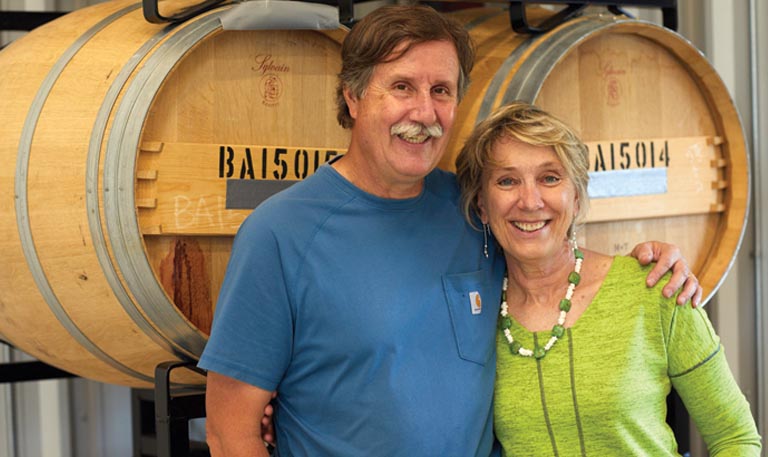We live in a field that likes to pretend it’s a farm. A 14-acre field just a stone’s throw from the city limits of Spokane. It’s got it all—noxious weeds, a herd of deer, a little farmstead slouching modestly on its cobble foundation, and an orchard so old that it rivals the spooky tree scene at the beginning of the Wizard of Oz. And a production winery, alas, 4,000 square feet of one.
Look to the South from our property and you’ll see Ponderosa pine-covered hills, Spokane’s signature vibe. Look to the West and you see the demarcation line between farms and suburbs, the old and the new West. The sea of new houses comes closer to us each month but hasn’t jumped the road yet. Change is definitely coming and maybe that’s just fine.
But I’m not thinking about the urban growth boundary tonight. On the nightly walk back from the winery to the house, I always try and take stock. Anyone can take stock and reflect on the big things in life, but I think older people like me are particularly good at it. I’ve lived long enough and had enough of a complicated life to appreciate the luxury of being able to walk across a scratchy grass field at sunset and think about how fortunate we truly are.
It’s hard to write about winemaking without sounding completely full of yourself. It’s a topic inextricably linked to hubris and ego. Starting a winery requires only a love for the fantasy of winemaking (and a seemingly endless stream of money). Staying with a winery requires much, much more. It requires a deep love of a slow craft. After five years we’re finally getting there—thanks in no small part to my husband, a man who is an impresario of projects. Every day is project day for Dr. Phil Butterfield. Recent projects included bottling Malbec, topping barrels, and finding a better cork supplier. Then there are those projects that involve setting up blending trials and killing—albeit in the most humane way possible—vagrant ground squirrels. Not quite the “Town and Country” version of winery ownership that people imagine. Rather, it’s our version—power washing equipment late into the night during the fall harvest, hearing the busy hum of winery guests all summer, and learning to become a germ-free zone throughout a pandemic. Whew. Winemaking brings with it a seasonal rhythm we’ve both come to appreciate. And thank God for our amazing staff who have stayed with us this past year. They are the real essential workers and the authentic heroes of the COVID recovery.
Beyond Phil and our incredible team, I can honestly say our wine club members got Winescape through the pandemic. Like all hospitality venues we were open, then closed, then open and closed again concurrent with the ebb and flow of the pandemic. When we were closed, our “winescapers,” as we call them, sent us notes of encouragement and showed up to buy wine anytime we put the word out on a sale or special. They volunteered to help sort grapes, label bottles, or do whatever else was needed. They would drop food off for us during harvest, just when it seemed we couldn’t get any more nuttily incoherent from working 40+ successive days. In sum, our wine club members showed up spontaneously when we needed them most. They stayed with us in a way that touched us profoundly.
We try to pay them back by making great wine, knowing that our bottles will be opened on holiday tables and on special nights with friends. And I have to say that the wines are really good. Phil designed water treatment plants for engineering company CH2M Hill for 25 years before getting into academia, then winemaking, so he knows a thing or two about water (or wine) chemistry. Then to top it off he got a PhD in biofilm engineering, just so he could techno-shame us with his newfound understanding of microbiology. Clean winemaking, true to the varietal, is his forte. As a former dean (go Cougs) and department chair (go Huskies…kind of), I have a type of vague and marginally useful skillset for winery ownership. So, I do a lot of the behind-the-scenes work, run endless errands, and do our marketing and social media work—after decades of shunning this stuff.
It’s getting late on this evening as I write this, and Phil needs to push the destemmer back into the winery; otherwise, he’ll worry about it and won’t be able to sleep. Sure, I’ll head down there, too, and open the roll-up door. Then walk back. It’s a chance to walk across the field during magic hour. Another chance to take stock.
Dr. Patricia Butterfield has served as faculty at Oregon Health & Science University, Montana State University, University of Washington, and Washington State University (WSU). She was Dean of Nursing for WSU statewide from 2007-2015. Her research addresses environmental health risks to rural and underserved families. She recently retired from the Elson S. Floyd College of Medicine at WSU.


